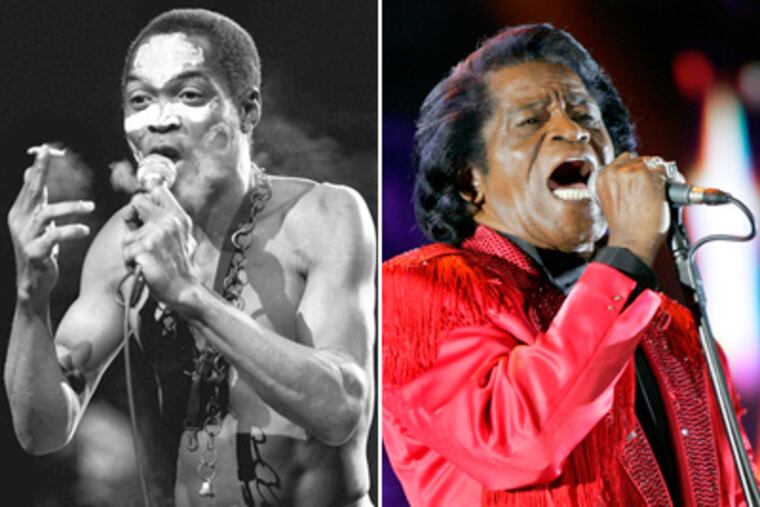Africa's James Brown? America's Fela
Fela Anikulapo Kuti, the Nigerian bandleader and political firebrand whose life and legacy are celebrated in Fela!, the Broadway musical that completes its eight-show run at the Academy of Music with two performances Sunday, is a singular figure in pop-music history.

Fela Anikulapo Kuti, the Nigerian bandleader and political firebrand whose life and legacy are celebrated in Fela!, the Broadway musical that completes its eight-show run at the Academy of Music with two performances Sunday, is a singular figure in pop-music history.
As an artist, Fela - who's best known mononymously, like Madonna or Adele - continually expressed his contempt for the military dictatorship of his own country, as well for what he saw as the rapacious colonialism of Western business interests.
Despite the unyielding political streak that saw the singer jailed numerous times - or, perhaps, because of it - Fela was a massively popular recording artist in Nigeria, mourned as a national hero after his AIDS- related death in 1997. More than a million people attended his funeral.
So, is there an American musician analogous to Fela?
"You'd have to imagine, maybe, a Bob Dylan who was arrested 200 times," says Bill T. Jones, the Tony-winning choreographer who cowrote the book for Fela! and also directed the show. "To find an analogy, you'd have to go to pure politics, really. Malcolm X? Martin Luther King?"
In a musical sense, though, there's an American figure who overlaps with Fela in instructive and influential ways:
James Brown.
"There are a lot of similarities" between the Godfather of Soul and the founder of Afrobeat, says Adesola Osakalumi, one of two actors playing Fela in the show's Philadelphia run. "They were two incredibly outspoken prolific geniuses - talented, unrepentant artists who lived their lives as passionately and as freely as they could."
As Fela was shaping his musical identity, he borrowed from sources as varied as traditional Yoruba drumming and Elvis Presley, whose taste in jumpsuits he admired. In Fela!, Brown's music makes a first impression on Fela through Sierra Leonean singer Geraldo Pino, who appears as a parodic Brown imitator. After seeing Pino in 1966, the real Fela said: "I knew I had to get my [stuff] together. And quick!"
Both Fela and Brown were authoritarians. When the Afrobeat founder heard one of his band members make a mistake, as Jones tells it, he would often stop the show and humiliate the offender "in the most abusive terms." Brown, more typically, would level severe fines taken out of the musician's pay.
The impact of Brown's music in Africa is noted in The One, RJ Smith's excellent new biography. When Brown played in Lagos in 1970, he was greeted as a cultural hero. "Band members were told that more copies of 'Say It Loud (I'm Black and I'm Proud)' were sold in Nigeria than there were turntables to play it on," Smith writes.
"A true cultural exchange took place," Osakalumi says, noting that when Fela traveled to America in the 1960s, he was "re-Africanized" in part by hearing Black Power anthems like "Say It Loud."
There's no evidence, however, to suggest Brown listened to Fela's music. As Smith describes the trip to Lagos, "the American was finding his way back to Africa without having heard African music. What he heard was the subterranean Africa, fracked by slavery. . . . He heard it through pop music and black drumming traditions in the South. He made it all up himself . . . and now he was on African soil."
So did a meeting of these "two protean messiahs," as Smith refers to them, ever take place? Despite Fela's competitive nature - he sometimes claimed that Brown "stole my music" - he did extend an invitation for Mr. Dynamite and the JBs to visit his rebel enclave The Shrine, where Fela! is set.
The equally competitive Brown, however, decided not to go, perhaps because he couldn't bear playing second fiddle to anyone. Bassist Bootsy Collins and many members of the JBs did go, though. And through their ears, Fela might yet have shaped Brown's sound.
"When I heard those cats, it was like another dimension," Collins told Smith, in comparing the sound of the JBs to Fela's band, Egypt 80. "And it had a deeper feeling to me. When I heard them, that was the deepest level you could get."